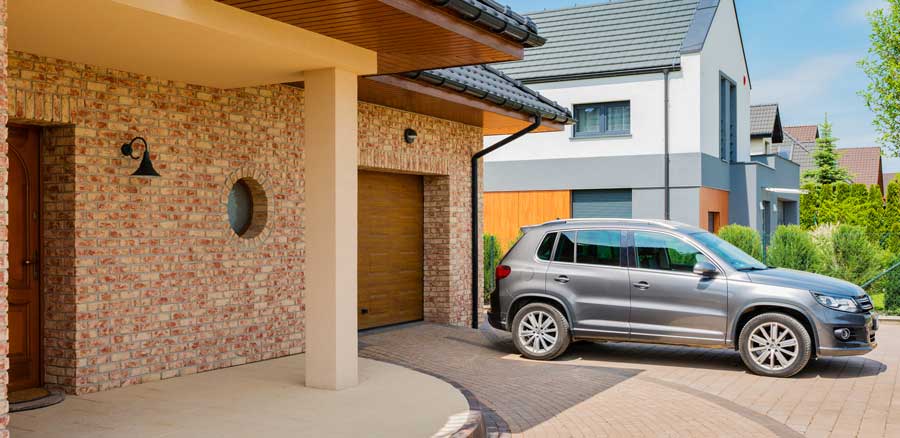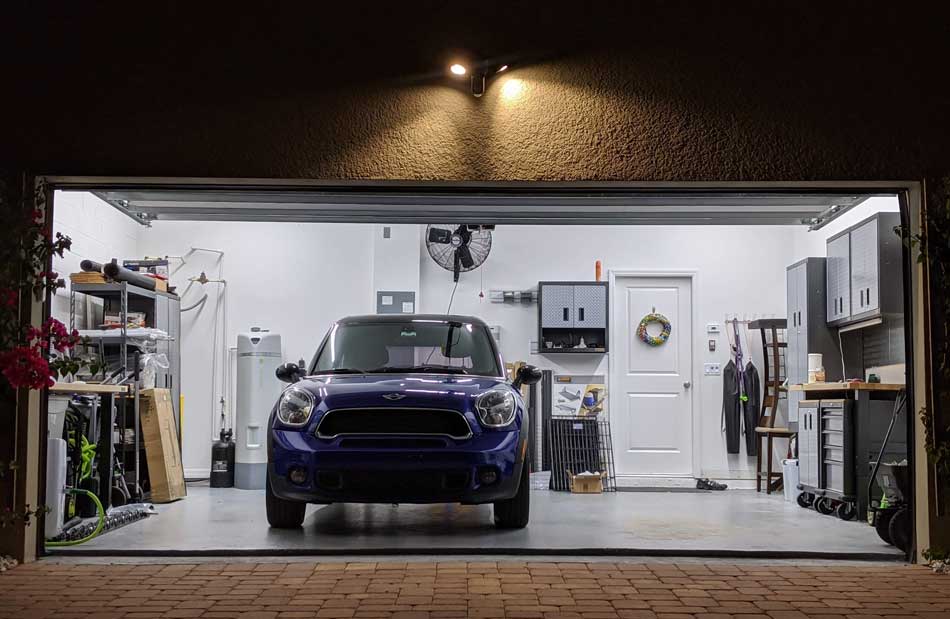Does keeping a car outside vs garage parking it really make a difference?
More than just protection from the elements, a garage offers numerous benefits to make your life easier and save money.
Whether it’s security, lowered insurance rates, or added convenience, the advantages of garage parking extend far beyond the obvious.
In this article, we’ll explore ten compelling reasons why you should park your car inside a garage. Let’s get started.
More Exposure to the Elements
Garages shield your car from direct exposure to harsh UV rays. Picture this: a garage is to a car what sunscreen is to your skin. It prevents UV rays from bleaching your car’s paintwork.
And it doesn’t stop at UV protection. Keeping your car in a garage protects it against the damaging effects of dust, debris, and moisture, preventing unsightly scratches and dents.
What about temperature fluctuations?
In a garage, your car is less likely to bear the brunt of temperature changes. That could wreak havoc on tire pressure, engine performance, and battery life.
For instance, according to Intercel, a leading European battery supplier, for every 15 degrees F above 77, your car battery’s life is cut in half.
Rain and snow, combined with road salts or chemicals, can trigger rust and corrosion on your car’s metal parts. It’s like your car catching a cold that it just can’t shake off.
Strong winds can launch dust and debris onto your car’s surface, causing scratches and even dents.
On the flip side, exposure to sun and heat can result in fading and cracking of your car’s paintwork, plastic parts, rubber seals, and upholstery.
In fact, a survey by Consumer Reports found that 53% of car owners experienced sun damage to their car’s paintwork.
Moreover, consider the potential impact on your car’s resale value. Kelley Blue Book states that even a simple scratch on your vehicle could diminish its resale value by up to 10%.
The bottom line is this: parking your car in a garage is like investing in a protective shield.
It’s about maintaining your car’s health and value for the long run. So, consider where your car spends its downtime – it could make all the difference.
Exposed to Theft & Vandalism
A garage isn’t just a shelter for your car against the elements. It also serves as a safe haven, protecting it from theft and vandalism.
Think of your garage as a personal bodyguard for your car. It makes it less visible and accessible to opportunistic thieves or vandals who may have their sights set on your vehicle’s valuable parts or simply be out to cause damage.
Your car, safely parked inside a garage, isn’t an easy target.
The presence of security cameras and alarms make breaking into or damaging your car unattractive. In a locked garage, it becomes even more challenging for would-be criminals to unlock, start, or tow your car away using tools or devices.
And let’s face it, many criminals are looking for easy, less risky targets. A locked garage presents an obstacle many won’t try to overcome.
The numbers around car theft and vandalism bring home the importance of this issue. According to the National Insurance Crime Bureau (NICB), more than 1 million vehicles were stolen in 2022, a 7 percent increase from 2021. The first time thefts have exceeded 1 million since 2008.
Keeping your car in a garage isn’t just about maintaining its appearance and performance; it’s also about safeguarding it against potential threats.
A garage can be the fortress that keeps your car safe, secure, and yours. In the end, isn’t peace of mind worth the extra step of garage parking?
Higher Insurance Rates
Parking your car in a garage isn’t just about its physical protection; it also carries financial advantages. Let’s explore how parking your car in your garage instead of your driveway can impact your wallet.
First, it can result in lower insurance rates.
Why? Because it decreases the risk of theft or damage to your vehicle and its contents, which is music to your insurer’s ears.
What about weather-related insurance claims, like hail or flood damage? With your car nestled safely in a garage, the likelihood of such claims drops significantly. A garage can also contribute to a cleaner driving record by helping you avoid weather-related accidents as you exit or enter your garage in less-than-perfect conditions.
Some insurance companies acknowledge the protective role of a garage and reflect this in their rates. As part of their comprehensive coverage – which covers non-collision related damage – these companies may offer discounts for cars regularly parked in a garage.
Even when calculating collision coverage rates, which pay for damage caused by accidents, some insurers factor in whether a car is parked in a garage. However, they may require proof, such as a lease agreement or utility bill, to qualify for the discount.
How much can you save?
According to PolicyGenius, many insurance companies offer lower rates if you park your car in a garage, but only on full-coverage policies.
The discount can vary, but it could be around 5% depending on the insurer and the state.
More Likely to Have Accidental Damage
If your car is parked outside, it’s vulnerable to accidental damage from objects or animals that might hit or scratch your precious ride. But with garage parking, your car is secure from these unpredictable encounters.
Moreover, think about the hazards of street or public lot parking. Your car, tucked away in a garage, is safe from other vehicles or people that might accidentally bump into or even vandalize your vehicle.
Natural disasters?
Unpredictable and destructive events like floods, fires, earthquakes, or landslides pose a considerable risk to vehicles parked outside. A garage, in contrast, offers your car a protective cocoon.
Now let’s consider daily life around your property. Bicycles, basketballs, and even toys can inadvertently become sources of dings, scratches, or dents. With your car safely parked in a garage, you can breathe a sigh of relief as these worries disappear.
Additionally, garage parking does more than protect against more significant threats.
It reduces your car’s exposure to everyday nuisances like dust, dirt, pollen, or bird droppings. We all know the damage these can inflict on your car’s paint or glass.
In stormy weather, your garage-protected car remains safe from falling branches, icicles, or hailstones.
So, when considering keeping your car outside instead of inside your garage, remember that a garage provides your vehicle with a layer of protection against the unpredictable.
It’s a buffer against the accidental, the everyday, and the extraordinary, helping maintain your car’s appearance and value over time.

It Shortens Your Vehicle’s Life
Garage parking can significantly extend the life of your vehicle by offering protection from extreme temperatures and outdoor elements.
When parked in a garage, your vehicle enjoys a more stable and comfortable temperature, which is critical in preventing damage to its mechanical and electrical components, such as the engine, battery, and fluids.
Not just that, but a garage acts as a shield for your car from dust, dirt, pollen, bird droppings, and other contaminants. If left unchecked, these can rust or scratch your vehicle’s paint or glass.
Moreover, parking your vehicle in a garage safeguards it against severe natural disasters like floods, fires, earthquakes, or landslides. These events can cause significant, often irreparable, damage to vehicles parked outdoors.
But garage parking isn’t only about preventing significant damage. It also helps maintain your car’s appearance and value by preventing cosmetic damage.
Parking your car in a garage can keep its color vibrant and shine intact by reducing exposure to UV rays that can fade or crack the paint.
Your garage-protected car remains safe from dents and dings caused by hail, falling objects, or other vehicles when parked outside. Furthermore, garage parking helps avoid potential vandalism or theft that could ruin your vehicle’s exterior or interior.
Driveway Vehicle Maintenance Is Harder
One often overlooked advantage is the ease of vehicle maintenance when your car is parked in a garage.
When your car is parked in a sheltered, well-lit, and comfortable environment. It makes it much more convenient for you to perform regular maintenance tasks, such as checking and changing fluids, tires, filters, etc.
A garage can protect your tools and equipment from theft, damage, or weather exposure. This extra layer of security is especially crucial for those of you who have invested in high-quality or specialized tools for your car.
Parking your car in a garage also helps avoid common issues affecting parked vehicles. These include rusting brakes, evaporating battery fluid, tire dry rotting, and more.
Beyond convenience, garage parking saves you time and money on repairs and replacements. Reducing wear and tear from outdoor elements significantly extends the lifespan of your car parts and components.
Additionally, keeping your car in a garage can prevent cosmetic damages that lower your car’s value and curb appeal, such as paint fading, cracking, and chipping.
And let’s not forget the potential savings. You can significantly reduce your vehicle’s maintenance costs over time by avoiding costly repairs often associated with outdoor parking, such as replacing catalytic converters, batteries, tires, and more.
Lowers Your Home’s Curb Appeal
Did you know that something as simple as parking your car in a garage can actually increase your home’s resale value? By keeping your car tucked away, you’re not only improving your home’s overall curb appeal but also increasing its functionality.
A tidy and spacious driveway or yard is much more attractive to potential buyers than one cluttered with vehicles and other items. Plus, it shows that you’re using your garage and investing in your property.
Zillow reports that a garage is one of the most desired features for home buyers. When potential buyers see that you have room for tools, bikes, gardening equipment, and more, they’ll be more likely to envision themselves living in your home.
Another benefit of garage parking is the increased security and safety it provides for your home. Parking your car in a garage prevents unauthorized access to your vehicle and its contents. It reduces the risk of accidents involving your car.
This added layer of protection is a major selling point for buyers who value convenience, comfort, and security for their vehicles and belongings.
Realtor.com states that a garage can add up to 13% to the value of a home. With this in mind, it’s clear that garage parking is a wise investment for homeowners looking to boost their home’s resale value.
Leads to Less Storage Space
One of the key benefits of parking your car in a garage is the ability to utilize the remaining space for storing items that may not fit in your house or yard.
By installing shelves, cabinets, hooks, racks, and bins, you can optimize your garage space and keep your belongings organized and easily accessible.
But that’s not all – parking in a garage also offers added protection for your items, shielding them from theft, damage, or weather exposure. This is particularly important for valuable or sensitive items that could be affected by temperature or moisture.

According to The Wall Street Journal, 74% of homeowners agree that parking is the most important function of a garage, but only 25% are satisfied with their current garage organization.
Another advantage of parking in a garage is the impact it can have on your driveway or yard. Keeping your car tucked away can make your outdoor areas look more spacious and tidy, reducing clutter and congestion caused by multiple vehicles or trailers.
This newfound space can also be used for other activities or features, such as playing, entertaining, landscaping, or gardening. And let’s not forget the curb appeal – parking your car in a garage enhances the appearance and accessibility of your home’s entrance and walkway.
Or, as Neighbor suggests, renting out your garage for storage can be an easy way to earn extra income.
It’s More Inconvenient
We all know the feeling of stepping into a freezing cold or sweltering hot car, right?
With garage parking, your car is parked in a covered, well-lit environment, making it easy to get in and out without having to brave the elements.
No more shivering in the cold or sweating in the heat while you wait for your car to reach a comfortable temperature.
Did you know parking your car in a garage can save you time and hassle during bad weather?
A study by Morton Buildings found that garage parking can save car owners up to 20 minutes per day during the winter months, avoiding scraping ice or snow off your windshield or waiting for your car to warm up or cool down.
Garage parking can also help extend the life of your vehicle by protecting it from extreme temperatures and outdoor elements.

It May Increase Garage Clutter
Let’s face it – clutter can be overwhelming, and a disorganized garage is no exception.
However, parking your car in the garage can help reduce clutter and keep your garage organized, improving your mental and physical well-being.
When you park your car in the garage, it encourages you to use your available space better.
You’ll be more inclined to avoid storing unnecessary or unwanted items that consume valuable room.
No one wants to navigate a maze of boxes and tools just to park their car. Parking your car in the garage will make you more likely to prioritize what’s truly important and discard the rest.
Garage parking also promotes better organization of your belongings.
By using shelves, cabinets, hooks, racks, bins, and other storage solutions, you can store items on the walls or overhead, freeing up valuable floor space for your vehicle.
Not only does this create a more organized space, but it also makes it easier to locate and access your items when you need them.
Another advantage of parking your car in the garage is utilizing the extra storage space it provides for items you don’t use frequently or seasonally.
Instead of cluttering up your living space with unused items, you can store them in your garage, fostering a cleaner, more organized home.
Maintaining a clutter-free garage, you’ll experience less stress and frustration when trying to find and access items. We’ve all been there – searching for that one tool or box amidst the chaos. Parking your car in the garage and keeping an organized space can help alleviate those stressful moments.
Plus, who doesn’t enjoy stepping into a clean, organized garage every morning before tackling the day?
Lastly, parking your car in the garage can protect your health and safety by preventing dust, dirt, mold, pests, or fire hazards from accumulating.
A cluttered garage can be a breeding ground for these issues. Still, keeping your space organized and free of unnecessary items reduces the risk. It creates a healthier environment for you and your vehicle.
Wrapping It Up: Does Keeping a Car Outside vs Garage-Parked Bad For It?
In conclusion, parking your car inside a garage presents a multitude of benefits that extend far beyond mere protection from the elements.
By providing a safe haven for your vehicle, a garage is a deterrent to theft and vandalism, helping secure peace of mind. The insurance benefits, too, cannot be overlooked – with lower rates and fewer claims, you can enjoy financial advantages.
Your car will also thank you for the added protection from accidental damage and extreme weather conditions, maintaining its value and longevity in the long run.
Garage parking can also contribute to easier vehicle maintenance, boosting your home’s value, and optimizing your storage space, highlighting the garage’s versatility.
Additionally, the comfort and convenience of stepping into a temperate car, regardless of the weather outside, is undeniably appealing. Finally, parking in a garage encourages better organization, reduces clutter, and fosters a cleaner, safer environment.
So, remember these reasons the next time you come home and contemplate where to park your car.
Your car, wallet, home, and even peace of mind could benefit significantly from parking inside a garage. Take the extra step – it’s worth it.
